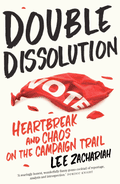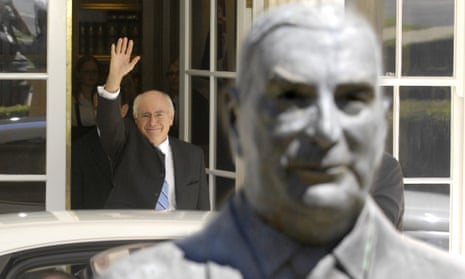Monday night’s Four Corners program about the treatment of asylum seeker children on Nauru has seen the program and the ABC attacked by both the Australian and Nauruan governments. These broad swipes – attacking the ABC as an institution rather than addressing the merits of the journalism – is an approach that only works if you’ve been undermining the national broadcaster through years of culture wars.
The entire conservative attitude towards the ABC was summed up in a single exchange last month.
The former prime minister John Howard was doing the media rounds in mid-September to promote the ABC-produced documentary he had made about his own favourite prime minister, Sir Robert Menzies.
On 15 September Howard spoke to Tom Switzer on Radio National’s Between the Lines. Switzer, a journalist and former Liberal National party adviser, frequently explores international politics with guests from traditionally conservative outlets such as the Daily Telegraph, Fox News and the Wall Street Journal. It’s an often-interesting program, a million miles away from the cartoonish Sean Hannity clips that have come to represent rightwing commentary.
The interview with Howard was light and conversational, which seemed appropriate for the interview topic. (A former prime minister discussing a TV series he made about another former prime minister is not really the place to re-prosecute the Iraq invasion. Your mileage may vary.)
Then the moment came.
SWITZER: Menzies once said of the ABC, “I have never been persona grata with the ABC, nor the ABC with me.” So let’s hope your experience today means you’ve had a different view about the ABC.
HOWARD: Hahaha, next question.
A seemingly innocuous exchange, and hardly a surprise to hear someone on the right chuckle at the idea of receiving a fair go on the ABC. But the fact that we are so used to this type of offhand commentary highlights the absurdity of this particular situation.
Let’s set the scene: this was at least the third promotional interview Howard had done on the ABC that week, which included time on ABC TV’s Lateline and Radio National’s Drive, not including the live broadcast of Howard’s National Press Club address on the legacy of Robert Menzies, all of it designed to promote Howard’s three-part documentary that the ABC had itself funded. The airwaves were so dominated by commercials for the series, I could probably recreate them verbatim should the need ever arise.
So as Howard and Switzer sat in the ABC studios promoting a Menzies puff piece that had been made on the ABC dime, they chuckled at the unspoken but clearly understood premise that the ABC is a hive of leftwing Trotskyites, working overtime to keep the conservative message down. Caricaturists need not apply.
This view is one that is profoundly unshakable, no matter what the evidence actually shows. In a 2009 research paper, How Partisan Is the Press?, the economists Joshua Gans and Andrew Leigh (now a federal Labor MP) discovered that the ABC’s coverage slanted more significantly towards the Coalition. This study was released seven years ago but it is a revelation that has never managed to take hold in the public mind, failing to challenge accepted wisdom. The message certainly didn’t make its way to Howard.
Meanwhile the ABC itself exists in a state of everlasting course correction. Determined to avoid the appearance of bias, it uses its flagship program Q&A as a cosmetic ballast.
The newly elected One Nation Senator Malcolm Roberts was provided with airtime so he could peddle conspiracy theories about global warming. When an actual scientist, Brian Cox, asked if Roberts believed the moon landing was real, Roberts took offence, viewing Cox’s question as an underhanded rhetorical swipe. But Cox meant the question: if global warming is a gigantic global conspiracy then how much of reality do you question? If that’s how far we need to go to establish a baseline of sanity then something is seriously wrong.
In 2014, when he was communications minister, Malcolm Turnbull announced a $254m funding cut to the ABC over five years. This year $20m was cut from reporting and digital services. Journalists have been made redundant and the Fact Check unit was shut down. The ABC is being chipped away, bit by bit, and every joke about its inherent, ingrained bias makes it easier to justify.
Much of the disdain for the ABC stems from a deeper ideology, one that is rooted in the free market and sees the concept of a public broadcaster as barely indistinguishable from state propaganda, even if the state itself keeps objecting to it.

In an environment saturated by privately owned news outlets, justifying a taxpayer-funded news organisation seems like an impossible needle to thread. And yet one glance across the environment of broadcast journalism and the value of a broadcaster focused on the public interest becomes immediately apparent.
Attacking the journalism conducted by Four Corners is hardly new territory. The program regularly produces stories that affect the national conversation and even policy: a shocking report on live baiting in greyhound racing led to major reforms to the industry; a story on child abuse in youth detention had the prime minister immediately calling for a royal commission; footage of live cattle exports led to an immediate, albeit temporary, ban on the practice.
At a time when the ABC is fighting for its survival it has refused to shy away from difficult and provocative journalism that often upsets the very hands that control its purse strings.
The problem is that no accord can be reached. There is no incentive for the ABC’s critics to concede any ground on its ideological makeup: there will never be a time where they confess that, yes, the ABC’s reporting typically bends in every direction to find the impossible moment of balance. They will never admit that its analysis can be seen as right-leaning just as often as it is seen as left-leaning. There is absolutely nothing to be won in such a confession.
So long as this belief continues, the ABC will inevitably and self-consciously shift itself to the right. It’s a win-win for conservatives. Like a boa constrictor tightening around its prey, it’s a game of inches that will only ever move in one direction.
Lee Zachariah is the author of a new book, Double Dissolution: Heartbreak and Chaos on the Campaign Trail, which is available now.
